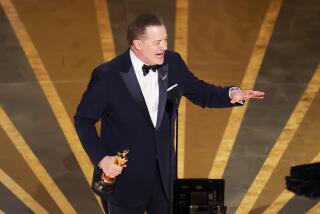WHALE WATCH
- Share via
I’m mystified how Brendan Fraser could make the statement “No one really knows exactly what happened to James Whale” (“Frankie’s Director Goes to Hollywood,” by Jon Burlingame, Nov. 2).
Whale’s death was documented as a suicide in my book “James Whale,” which was published in 1982. In fact, Christopher Bram acknowledged his debt to my book in his novel “Father of Frankenstein,” which is the source for the film in which Fraser appears. Bram credits me with having “cleared up a major mystery” in publishing Whale’s handwritten suicide note.
I cover Whale’s death more thoroughly in “James Whale: A New World of Gods and Monsters,” a full biography that will be published next spring by Faber and Faber. The film rights have been optioned by producers Ronald Shedlo and George Akers on the conviction that the real story of James Whale is far more compelling than any fictional treatment.
JAMES CURTIS
Brea
If he had never directed “Frankenstein” and “The Bride of Frankenstein,” James Whale would be remembered as the brilliant director of the Paul Robeson-Irene Dunne “Show Boat,” the best of all its adaptations; the bizarre and comic “The Invisible Man” with Claude Rains, which is in no way “horrifying”; and the splendid Louis Hayward-Joan Bennett “The Man in the Iron Mask,” which remains the most enjoyable version of Dumas’ adventure classic.
Whale also directed the notable black comedy “The Old Dark House” from a novel by J.B. Priestley and “staged” the dialogue scenes in Howard Hughes’ World War I flying epic “Hell’s Angels,” one of the earliest and greatest sound films.
Whale’s subject was not “horror” or homosexuality. It was the plight of the outsider. He portrayed it on film with wit, dignity and considerable genius.
He deserves better than to be presented as an Ed Wood grotesque--and it’s to be hoped that Clive Barker and Ian McKellen’s film measures up to the talents of the man who inspired it.
RICHARD KYLE
Long Beach
More to Read
Only good movies
Get the Indie Focus newsletter, Mark Olsen's weekly guide to the world of cinema.
You may occasionally receive promotional content from the Los Angeles Times.










